 |
 |
 |
 |
 |
 |
 |
 |
 |
European Cup Winners' Cup quarter-final first leg - Elland Road - 25,702
Scorers: Giles (15 mins), Clarke (28), Lorimer 2 (35, 56), Jordan (65)
Leeds United: Harvey, Reaney, Cherry, Bremner, McQueen (Yorath 83), Hunter, Lorimer, Clarke, Jordan, Giles, Madeley
Rapid Bucharest: Raducanu, Pop, Grigorias, Codrea, Stelian, Musat, Nasturescu (Dinai 73), Savu, Neagu, Florin, Dumitru
Given the scintillating
football the team displayed in the spring of 1972 and the
club's outstanding level of experience in Europe, it was easy
to understand the expectation that United would go a long way
in the competition. On paper that seemed a safe prediction; on grass,
the matter was less clear cut. A first round pairing against MKE Ankaragucu of
Turkey seemed a formality, despite the long trip for the first
leg in the Turkish capital; it was the furthest United had needed
to travel in eight seasons of European competition. The game represented
the Turks' European debut, whereas it was United's 65th match
in such tournaments. Despite receiving a warm welcome from generous hosts,
United had to be content with a 1-1 draw from the first leg before
scraping through by virtue of Mick Jones' goal at Elland Road. The pattern was repeated in the second round, against the
East Germans, Carl Zeiss Jena. A goalless draw in the first leg in the
Ernst Abbe stadium was a reasonable opening gambit, but it was the second
half of the second leg before Trevor Cherry's powerful strike broke the
deadlock at Elland Road. A second came a Mick Jones header as he followed
up when a Peter Lorimer strike came back off the goalkeeper in the 64th
minute; that provided some degree of comfort and Don
Revie pronounced himself 'delighted' with the 2-0 victory against
a side he clearly rated. Nevertheless, this was a series of tepid performances
for a side of United's standing and experience. The win at the beginning of November against Jena put United
through to the last eight, with the quarter-finals to be staged four months
later. Their opponents were the Rumanians, Rapid Bucharest, and Revie
was a little uneasy at not being able to consult the normal in depth dossier
on his opponents. Assistant manager Maurice Lindley and chief coach
Syd Owen had been unable to watch Rapid play and Revie was therefore
denied their customary detailed briefing. The mid-winter break
in Rumania coupled with an air strike had frustrated intentions
in that direction and Revie had to rely instead on a discussion
with Bill Nicholson, manager of Spurs, who had beaten Rapid in
the previous season's UEFA Cup. Tottenham beat Rapid 5-0 on aggregate, but Nicholson
described them as one of the toughest teams his side had faced.
The Spurs boss passed Revie his own file, claiming that if all
European teams were as rough as the Rumanians, he would prefer
Tottenham to remain out of continental competition. Revie commented: 'We must respect them, because they have
reached the quarter finals … Our plan is to attack right from the start
and gain a two-goal advantage for the return leg. We don't know much about
the Rumanians, except that they are supposed to be a very physical side.' Another feature emphasised in press previews of the game
was the colourful nature of Rapid's towering goalkeeper, Necula Raducanu.
In the Evening Post, Don Warters said of him 'flashy … loves to
entertain crowds with his tricks … Raducanu won 61 caps for Rumania and appeared at
the 1970 World Cup finals, where he became the first keeper to
come on as substitute in a World Cup match, replacing Stere Adamache
against Brazil. He is also the first Rumanian keeper to score
in an official match and the first to be caught offside. He was
to score seven times for Rapid over the following two seasons. The papers gleefully played up the story of a juggling
giant jester who would doubtless swing from his crossbar if asked
nicely! Before the match Rapid announced they would be playing
in an all-white strip, prompting a colour clash. It was a similar
situation to October 1966 when Standard Liege insisted on wearing
white when they played at Elland Road in the Fairs Cup. On this occasion, United general manager Keith Archer managed
to settle the matter amicably over a pint of beer, saying later: 'Apparently
the confusion arose because in the Rumanian League the home side has to
change should there be a clash of colours. But when we pointed out that
the UEFA ruling stated visiting teams should change, they immediately
agreed to switch to a red strip. There were no harsh words, and everything
was done amicably. We shall change to our yellow strip for the second
leg match.' United's only change from their weekend victory
against Derby was Joe Jordan in for Mick Jones. Young Gordon McQueen
swapped numbers with Paul Madeley, the latter taking the No 11
shirt rather than the 5 he had worn at the Baseball Ground, though
McQueen played at the back in both games. The match was every bit as physical as Don Revie had feared.
Eric Todd in The Guardian: 'Rightly or wrongly, most of us have
come to expect what are known euphemistically as "physical performances"
from foreign footballing sides, and Rapid's was no exception. Almost from
the start Stelian and Codrea decided that they did not like Bremner, and
Florin obviously had been deputed to attend to Clarke. There was a time
when Bremner would have retaliated and even last night he gave the impression
that he regretted signing the pledge of non-violence. Clarke, too, took
a lot of stick without complaint and I suspect that he allowed himself
a satisfied grin when Florin brought him down with a cruel tackle early
in the second half and was booked. Surprisingly this was the only booking. 'Rapid's exhibition deserved little more mention than it
has received already. All that need be said in favour is that before the
end they realised that crime does not pay and they allowed Leeds to play
football, when previously they had destroyed it. 'Jordan, deputising for Jones, who has a stomach complaint,
led the Leeds attack with the utmost enthusiasm, but Clarke again took
the major honour. Once or twice he ventured into enemy territory with
the righteous suspicion of a man entering a booby trapped area and it
was a miracle that he survived. Only a really great player could have
escaped some of those lunging tackles; only a great man could have kept
calm. 'There were other outstanding performances, notably by Bremner
and Hunter - who did not commit one foul, but let it be added this was
a team effort. And if ever there was a case of Virtue triumphant, then
this surely was it. In addition to McQueen, Clarke, Lorimer and Jordan
will all need treatment before the weekend, but they will carry their
scars proudly.' Don Warters in the Evening Post: 'After eight years
of European football, Leeds United are battle-hardened, but rarely can
they have been subjected to such crude softening up tactics as those employed
by the Rumanians of Rapid Bucharest. 'Good, it is said, triumphs over bad, and on this occasion,
United's skill, thank goodness, was more than sufficient to overcome ruggedness
in the extreme. 'In the opening minutes it became obvious United were in
for a rough ride. Billy Bremner was felled by Codrea and Peter Lorimer
suffered a similar fate at the hands, or rather feet, of Stelian. These
were offences which the referee stamped on but numerous other offences
were committed off the ball by defenders seemingly intent on provoking
United in general and Allan Clarke, Lorimer and Joe Jordan in particular. 'Nudges, kicks, taps - you name it, the Rumanians were doing
it - and the crowd of 25,702 were not slow to show their dislike by bouts
of slow handclapping. 'Jack Charlton, a
veteran of over 50 European matches for Leeds, watched it all patiently
from the stand. Afterwards he said: "It was hard out there. I think
they were hoping to put us out of our stride with such close marking,
but their tactics failed." 'The Rumanians had obviously heard about Clarke's scoring
prowess, and almost Norman Fox in The Times: 'For Leeds United, a journey
to Romania in a fortnight's time will bring risks to their bones but not
their reputation or future in the European Cup Winners' Cup. Last night
at Elland Road, in a first leg quarter final tie, they suffered a rare
physical battering even by their standards. Rapid came with aggressive
defence in mind. Leeds ensured that they left looking tactically foolish. 'As a spectacle of international misunderstanding, this
ranked high. Bill Nicholson, the Tottenham Hotspur manager, had warned
that Rapid were rugged. He understated the case, and did not take into
account the fact that Leeds are a far more rigorous team than his own.
The combination of Rapid's ruthless approach and the usual severity of
the Leeds tackling mixed into acid. 'Before condemning Rapid for some of the most destructive
football I have seen in England, it must be said that Leeds refused to
tone down their customary hard approach and this was bound to provoke
some bad feeling. Tackling from behind is still the red rag to any Continental
bull. Leeds waved that rag provocatively at times. 'It was only Rapid's tactical ugliness that saved them from
an even worse defeat. Their defensive intentions were destroyed like sandcastles
before Atlantic rollers. Within ten minutes they received a slow handclap
for their lack of ambition; within 45 they were three goals down and out
of their depth.' Mike Casey in the Evening Post: 'I don't know what
Mr W J Drennan, secretary of the Irish FA, the official observer at the
match, thought of the visitors' tactics, which made a mockery of soccer,
but I have seen dozens of European teams and none match Rapid in their
blatant disregard for the rules. Kicking, elbowing, shirt tugging, hacking,
even bear hugs … all were used by a team vastly inferior to their opponents
in skill. 'Unfortunately the tolerant Czech referee, Mr B Smejkal,
restricted punishment to occasional free kicks and a caution - Rapid defender
Florin eventually being cautioned after his umpteenth foul on Clarke.
The Czech linesman also appeared to ignore the niggling off the ball fouls
which must have encouraged Rapid to continue with the rough stuff. 'Happily for United, the match officials will be changed,
as is the practice for the second leg. Rapid's skulduggery failed to unsettle United and
the fillip of a 15-minute goal ensured that any Elland Road anxieties
did not have time to build up. Johnny Giles had already blasted one shot over from 22 yards
before he opened the scoring with another long range effort. Goalkeeper
Raducanu came out to punch away a long free kick from Norman Hunter and
seemed content with his efforts, for he made only token attempts to regain
either footing or position. The ball fell out to Giles 25 yards from goal
and the Irishman, 'tired of the attempts at prising Rapid from their shell'
(according to Norman Fox), coolly chipped the ball back over the keeper's
head. Raducanu got his fingers to the effort but could not keep it out. It was more than ten minutes before United could
pierce the visitors again, and just as the crowd were getting
a little edgy, it was master goalscorer Allan Clarke who put any
fears to bed after a magnificent move. It began with Norman Hunter, deep in his own half,
feeding Giles. The Irishman flighted the ball forward to Joe Jordan,
who deftly headed on, allowing Clarke space to gather. For once
there wasn't a Rumanian tight enough to get in a challenge and
Clarke ran on to leave the keeper helpless with a beautiful drive. In the 35th minute, it was 3-0; Clarke deceived the defence
with a beautifully directed header, Lorimer raced onto it and hammered
an unstoppable shot past Raducanu and into the far corner of the net from
ten yards out. As Terry Brindle wrote in the Yorkshire Post, 'Standing
so close in the flight path of so much power, Raducanu's life must have
flashed before his eyes.' To all intents, the goal killed off the game as
a contest. Don Revie had more than the two-goal lead he had sought,
but United were not yet content and continued their good work
after the resumption. In the fifty-sixth minute United made it 4-0. Lorimer
was 25 yards out and saw Raducanu again failing to cover his goal.
His tremendous shot into the far corner left the keeper prostrate
on the turf, wondering where it had all gone wrong. We never had
a chance to witness one of his characteristic attacking forays. After 65 minutes Jordan was rewarded for an evening
of effort when he banged in United's fifth. Madeley sent Clarke
away and he teased and tantalised the weary Rapid defence over
a 25 yard run with some skilful control and footwork before tapping
on to McQueen, who had enjoyed a fine home debut, was led off
with an ankle injury seven minutes from the end. Eric Todd: 'He was given
an ovation and well he deserved it. He shirked nothing, he feared nobody
and his determined run stamped him as a player of really great potential.
I feared at Derby he might be a little over zealous in his tackling, but
on this occasion he gave an all-round performance with which no fault
could be found.' The Rumanians' trainer, Basil Marian, said: 'Leeds were
too strong for us. They practice modern football at its best. They were
really in superlative form, and I fear the return in Bucharest is merely
a formality.' Basil Gravu, head of the Rapid party, added: 'We have played
all over the world, and even against Brazilian teams, but we have never
met a team as good as Leeds, and as professional.' Don Revie refused to comment on Rapid's tactics,
except to say that he believed his team's vast experience in Europe
had helped them through and to appeal for strong officials to
be put in charge of the second leg on March 21. 'I just hope we get a strong referee in Bucharest,' he said.
'I thought our players kept their heads very well under provocation, but
they could do this only through the experience they have gained in 69
matches in Europe … This must rank as one of our best performances in
Europe.' United completed the job a fortnight later in the
second leg with an easy 3-1 victory. 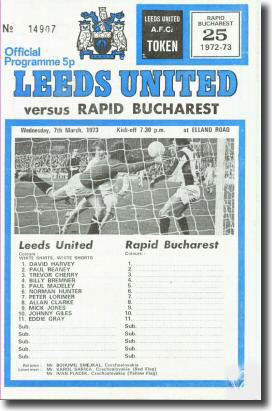 Leeds United's first attempt to win the European Cup Winners' Cup had
not been the easy stroll to glory that many critics had predicted.
Leeds United's first attempt to win the European Cup Winners' Cup had
not been the easy stroll to glory that many critics had predicted.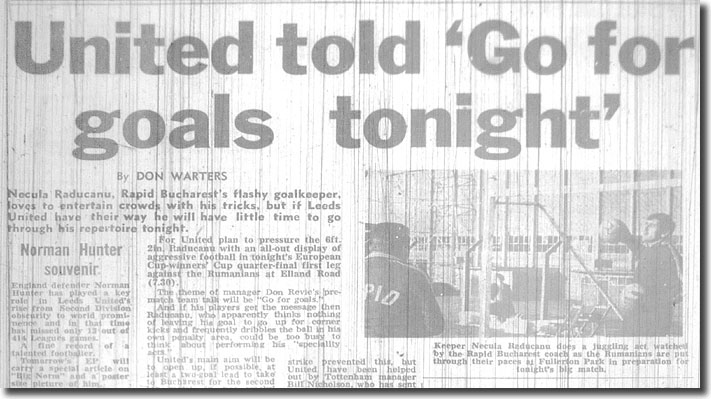 thinks
nothing of leaving his goal to go up for corner kicks and frequently dribbles
the ball in his own penalty area.' The Spurs dossier described him as
'acrobatic and a crowd player, very flashy and cocky'.
thinks
nothing of leaving his goal to go up for corner kicks and frequently dribbles
the ball in his own penalty area.' The Spurs dossier described him as
'acrobatic and a crowd player, very flashy and cocky'.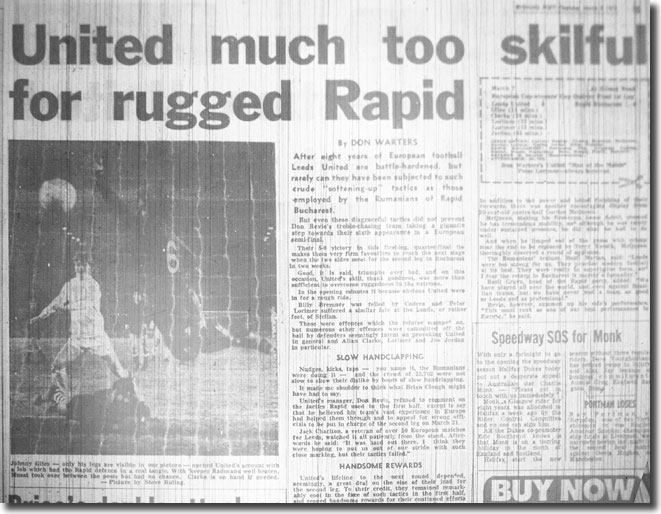 Apart
from the magnificent Raducanu, there was a steady display by Grigorias
and one or two brave runs by Dumitru, who had the distinction of bringing
Harvey to his only save. Leeds from start to finish deserved every credit
possible for their victory and the manner of its achievement.
Apart
from the magnificent Raducanu, there was a steady display by Grigorias
and one or two brave runs by Dumitru, who had the distinction of bringing
Harvey to his only save. Leeds from start to finish deserved every credit
possible for their victory and the manner of its achievement.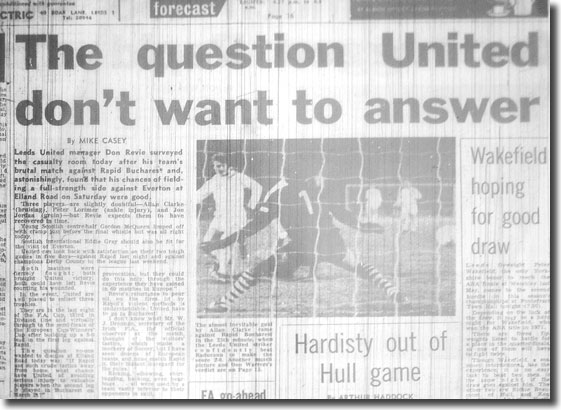 throughout
the match either Florin or Grigoras literally leaned on him.'
throughout
the match either Florin or Grigoras literally leaned on him.'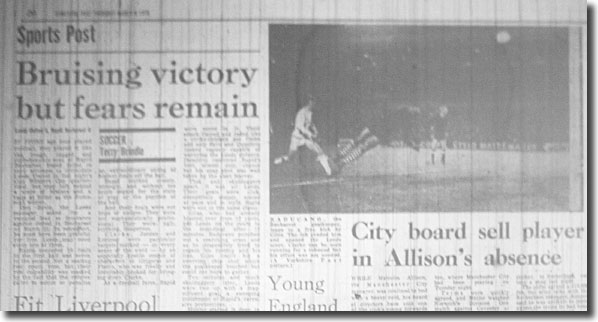 I
hope the Swedish replacements are more efficient. If not, I fear for United's
players.'
I
hope the Swedish replacements are more efficient. If not, I fear for United's
players.'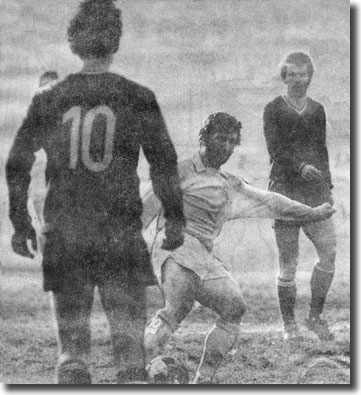 Jordan, who joyfully lashed the ball home.
Jordan, who joyfully lashed the ball home.